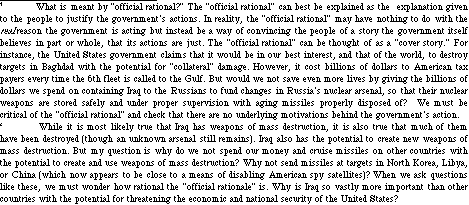

 1
2
3
4
5
6
7
8
9
10
11
1
2
3
4
5
6
7
8
9
10
11

|
consequences of that decision would be. It can be conjectured that the "official rational"1 States government in its decision to use cruise missiles on Baghdad is based on cost/benefit analysis of what would be in the best interest of the nation and the world--a utilitarian morality. The perspective of the United States is that the Iraqi government is developing weapons of mass destruction (chemical, biological, and nuclear weapons) with the potential for killing thousands (if not millions) of Iraq's enemies. The United States government finds that while other countries have made weapons of mass destruction, Iraq is unique in having used these weapons on its people and against Iran, as well as having invaded Kuwait and possibly used chemical weapons against US troops. It was the hope of the UN resolutions and agreements ending the Gulf War, that preventing the building of new weapons of mass destruction with weapons inspections by the UN was a fair and just way to prevent Iraq from threatening its neighbors again. Nevertheless, Iraq has often ceased cooperation in the search for and destruction of their weapons of mass destruction. In essence, Iraq has broken its agreement to allow inspections. Agreements are what moral behavior is woven together with and to break an agreement is immoral. The consequences of allowing Iraq to build weapons of mass destruction would be a shift in the balance of power and again threaten its neighbors in the Middle East and therefore would be a danger to the national security of the United States2 agreements, what should the United State's response be? Using a purely utilitarian philosophy, one based on efficiency and cost/benefit analysis, when diplomatic strategy and economic sanctions fail, it would be a logical decision to use force in the hopes of forcing the government of |
|||

|